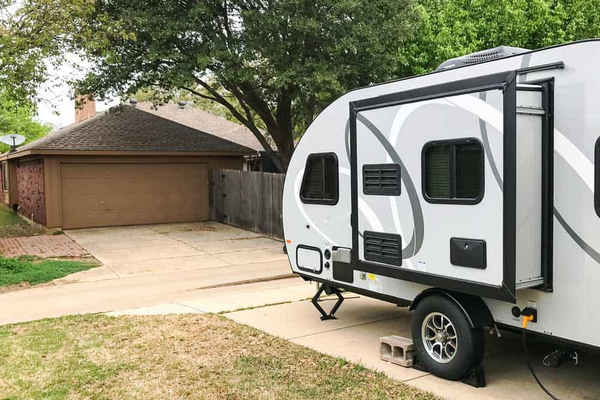
RV Water Hookup at Home: Can You Hook an RV Up to a House?
You can as long as city officials do not know about it. But once they find out, you may be facing a lot of fines. A lot of owners have various reasons why they want to do this project and one is to make their travel trailer a mother-in-law suite
Hook an RV to a house is possible and how you hook your trailer up will depend on your purpose. Temporary hook-ups are different from permanent or long-term hook-ups so you need to know which option you will do before starting the work.
To learn more about this topic and the work involved, just continue to read our article. It has the information you need to know about before you make the decision to build or not. It is not a simple situation to be involved with.
Can You Hook an RV Up To a House?
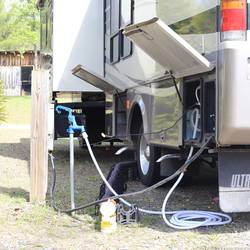
This will depend on what type of electrical service you want to use. If it is the normal 15 to 20-amp power you need, all you have to do is plug in a strong extension cord and you should be good to go.
However, this level of service may not be powerful enough to run an air conditioner or a 30 or 50-amp RV. In that case, you would need to install a dedicated 30 or 50-amp outlet to handle the power demand.
Then you have to take into account the size of your trailer and how it is wired. Smaller teardrop type trailers usually are wired for 110 or 120 power. That makes it simple to use an extension cord.
A larger RV or trailer will require 30 to 50 amp service if you are running more than the lights inside the RV, etc. For the latter options, you will need an electrician to install and wire the 30 or 50-amp outlet.
It is not something you can or should do yourself. For the former, if you are only using 110 power, make sure to turn the breakers off in your home first. Then check to make sure all electrical appliances in your trailer are shut off as well.
You can use an adapter if you want but after all the power is turned off, plug in the extension cord. Then turn your breakers back on. That is the safe way to handle this project.
The following appliances may have to wait their turn to be used if you are not hooking up to 30 or 50-amp service:
Air conditioning
Heater
Hairdryer
Microwave
Toaster
Toaster oven
And there may be more that needs to wait as 110 power cannot handle multiple appliances operating at the same time.
Can You Hook Up An RV To House Water?
Yes, this is a possibility. The key to doing this though depends on the color of the hose. If you always wondered why garden hoses came in different colors, the explanation is simple.
They are not all made for transporting drinking water. They all can transport freshwater but depending on the color of the hose, you cannot drink from all of them.
The only garden hose that is made that allows you to drink safely from them is white. This color of hose does not have the different chemical ingredients that green and other colored hoses have.
The reasons behind these different color systems are as follows:
1. Different colored hoses are made from plastic, rubber, or polyurethane and many of them contain the following harmful elements-- lead, tin, mercury, cadmium, arsenic, bromine, chlorine, and BPA
2. Safe Drinking Water Act (SDWA) doesn’t cover all hoses- while the water is the same that comes from your water pipes in your home, those pipes are governed by the regulations in this Act.
That Act protects you from over 90 contaminants so the water pipes are made in accordance with the act. Since the garden hose is not a pipe, it is not made from safe materials.
Except for the white-colored hose. It is supposed to be made safe and you can drink out of it without worry. You can also buy the white hose just about anywhere garden hoses are on sale.
RV Water Hookup At Home
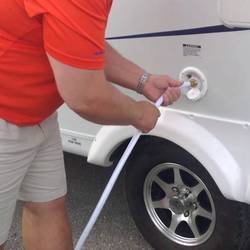
There is a process to do this safely. The first step would be to dig a trench from your source at the house to the post where you will make the connection to your RV. Even with little foot or vehicle traffic, this is a good move to make.
The trench will protect the water line from any type of accident that could happen on your property. If you live in a part of the country that gets cold, the trench will protect the hose from freezing over and getting ruined.
Just make sure you dig the trench deep enough. While you may want to keep this activity a secret, to be safe and legal, you should contact your local water department. They will inspect as well as give you the regulations you need to meet.
That is if you are making a permanent spot for your RV or trailer. If it is a short-term hook-up a white hose should suffice. When you dig the trench, contacting your local water company is very important.
You will need to know the location of existing water, power, or gas lines. Repairs to those lines can be very expensive. When you are doing a permanent hook-up, use the proper water pipe material and forget the hose. It is just better and safer.
The other aspects of constructing a water line are easier than this. You just need to dig a hole deep enough to hold the post. Then you attach the hook-up to the pipe so it is ready for a hose from the hook-up to the RV.
Insulate the exposed pipes and hoses to protect them from the cold in the winter season.
RV Electrical Hookup At Home
This is a little more difficult and possibly more expensive. Unless you have extensive training and experience in running wires, hooking them up and so on, you can’t do this yourself.
Before you start, you need to decide what type of power you need running to the outlet. Once you do that, you will know which type of electrical equipment you need to buy.
Unless you own a small trailer wired for 110 or 120 power, the equipment you will need to buy must accommodate either 30-amp power or 50-amp power. You should also have a 110 or 120 outlet on your electrical post. This will run things like heat tape and other smaller devices where 30 or 50-amps are too powerful.
Make sure you have all the outlets you need. Some people also suggest having a 15 or 20-amp outlet on the panel so you can cover other devices as well. WHAT all this means is that you need a professional electrician to do the work.
A good handyman may not suffice here as you need someone trained in breaker box connections, the type of wire you need, and the tools to hook everything up safely.
Having a professional to do the work will protect you from the insurance company, any fees or fines the city may charge you if it is not done right and replacement costs if there is a fire.
While you may want to save money, you need to protect yourself from possible future situations that will impact your savings. To protect those wires, you can dig a trench as well instead of hanging them up high.
That last option will depend on your property’s design and distance from the house or power source.
How To Hook Up An RV At Home
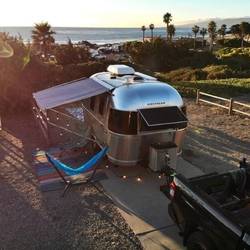
You just read about how to install your electrical and water hook-ups and once those are in, all you have to do is make the connections like you would at an RV campground.
There are two more items that you need to install if you want to be legitimate and avoid any illegalities in your city. One, if you do not have any level space around your home, you will have to install a gravel or concrete pad.
The key to this pad is that it has to be level. You do not park your RV on grass as the ground will settle eventually and take your RV out of level. The gravel or concrete options are the best ones to use.
For gravel you will need to level off an area for your RV or trailer, then dig that 30 or 40-foot by 10-foot area down 6 to 8 inches. The heavier your RV is, the more gravel you will need.
Then you will need some filter cloth on the dirt BEFORE you add the gravel. This protects your pad from having spots sink a little more than others. When you go to build your concrete pad, you will still need 4 to 6 inches of gravel (for drainage purposes) under the concrete.
Then you will need at least 4 inches of solid concrete with the right thickness of rebar to hold your RV or trailer. That thickness needs to change if you are parking a very heavy RV on the pad.
In addition, you still need to place the filter cloth in the pit before you add the gravel. On top of that, do not trench the water, sewer, or electric lines under your pad.
If there is a problem, you have to destroy your pad to fix the problem if it is in that location. Plan carefully
Connecting The Sewer Hook-Up
This is the second item we mentioned in the last section that needs to be addressed. This is going to be the biggest problem you will have as it affects your neighbors if anything goes wrong.
This is also something you may not be able to do secretly. It has been done and when the person made expansions to the motorhomes sitting on his property, he blew out his sewer system and contaminated the water supply of his neighbors.
His neighbors got sick and the authorities found out and you can guess what happened after that. So you will need to connect and build a proper sewer system if this plan is permanent.
If it is going to be temporary, then you may only be allowed to drive out when the tanks are full and dump those tanks at the nearest dump station. For a permanent situation, you have 3 options:
1. connecting to the current sewer system correctly
2. hooking up to or building a septic field
3. build a septic tank
Each option is going to cost you some money and you will have to get permits and inspections. With the first option, there may be some local problems. Your city or county may have laws against doing this.
That means you can’t do it unless you want to pay a lot of fines, penalties, or even spend a little time in jail (a rare possibility). You will need to contact the local office that handles sewer connection and see what they say.
If there is no law against it, then you just hook up as you do at a campground. The other two options can be expensive and depending on the side of your property, may not be feasible.
If that is the case, you are left with dumping the tanks at a dump station. There are many details involved in doing options 2 and 3 so you should research them to see if they will work for you.
If you leave on a large piece of land, several acres in size or more, or way out in the hinterlands of your state, you may be tempted to ignore all of those and do what you want.
We do not recommend that method as there are wild animals that may be poisoned, and you will ruin your property over time. It is best to stay legal and do all 3 hook ups and the pad correctly.
That way makes sure you have nothing to worry about if your RV or trailer is spotted. If you do it the other way, you may save money initially, but if you are caught, you lose that savings. It is your choice though but makes a good one in this situation.
Adding RV Hookups To Your Property
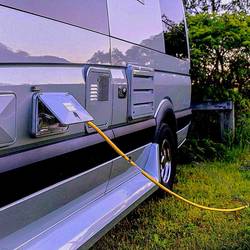
The first step in this process is to figure out your costs. Each professional will charge a different amount per hour for their labor and also different prices for the materials. You can save on the latter if you buy them yourself.
All you have to do is find out which materials you will need and shop around for the best price. That is something you can do to save money. In most cases, it is best to hire professionals as that way you know it was done right. If it wasn’t then you have legal recourse.
The overall general prices for a plumber, electrician, or sewer technician are as follows:
- $20 if you do it yourself to $750 if you hire a plumber. Price will fluctuate depending on the length of the water line, etc.
- $100 if you do this yourself up to $1200 if you hire an electrician. Again length and complexity will influence the prices
- $0 if you make the connection to an existing sewer line and you do it yourself. Or up to $3500 if you hire someone to do the digging, etc. for a septic tank or septic field. Again size will matter.
But before you start all of this work, you will have to contact your city or county departments to see how much permits will cost and the regulations you have to meet.
There are different regulations you will have to meet if you want a safe permanent location for your RV or trailer and someone is going to use it. If you are just storing your RV, then you can get away with parking it on grass or building a pad.
How To Install RV Hookups At Home
We provided most of the details earlier. When it is a temporary set-up, then you will not have to do all the work we mentioned in that earlier section. All you would have to do is install a 30 or 50-amp outlet nearby if you intend to allow your guests to use your appliances or other features.
For water in a temporary situation, you can use a white garden hose for the fresh water tank and a different colored hose for other water options. These two items are a matter of plugging in the extension cord and turning the fittings until they are tight.
The problem will be your gray and black water tanks. Some people dump their gray water right on their grass. This is a possibility if it is not illegal in your area. However, the black water tank is another story.
Many cities and towns do not allow you to tie your RV’s black water tank directly into your sewer line. This means that you would have to go out every few weeks and dump that tank in a dump station.
Depending on the size of that tank you may be doing this frequently or once a month. With temporary set-ups, you have to be careful about hooking your RV up to your home’s facilities.
Finding RV Hookup Installation Near Me
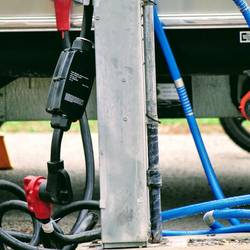
This is not as complicated as it may seem. What may confuse people would be those 2 letters RV. Those letters may cause people to think that they need specialized personnel to handle all the hook ups.
That is not the case. The professional traditional house plumber, electrician, and sewer technician can handle the same duties for your RV. The question will be if they are willing to be hired for that work and if they have time to handle it for you.
Electricity and correct wires do not change just because they are being connected to an RV and the same goes for a water line and the sewage system. Any professional should be knowledgeable enough to make sure your hook-ups meet the code.
All you have to do is do a local search for these professionals and talk to them. Just make sure to vet the one you want to hire to make sure you are not going to end up with a mess on your hands.
Make sure to check references and so on before hiring them.
Can You Live In Or Rent Your RV
Everything we have said so far is very straight forward and not that hard to do. The biggest hurdle you will have is if you can live in your RV, use it as a guest house or rent it out to strangers through those different online websites connecting travelers to homeowners.
It is hard to provide a very good answer in this limited space but suffice it to say, you have to check with your local city, county, and state laws first. Zoning may not be your friend.
Also, if you live in an HOA neighborhood, the rules of that association may prohibit you from doing any of this. There may be other statutes that may interfere with your plans.
Make sure to research this topic carefully to make sure you do not waste any money if you are told to stop.
Some Final Words
It is possible to install different RV hook-ups at your home. It is just a matter of time and money to get it done. However, you will need to check with your local authorities first.
They do get upset when you violate the laws on the books. Before you start you will have to decide how much work you are going to do so you can lower the costs, In most cases, hiring a professional is the best way to go.

